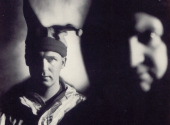
Milestones in Music History #27: Psychic TV, Art in Music
The musical universe of the 80s, which most people refer to as the "disco" or "dance" music era, was in fact a more varied and intriguing world. Certainly, there was a rise of disco halls everywhere in the world, and the interest of the audience shifted towards music was more entertainment than understanding. It is also true that the change in society and culture, coming with exponential economic growth, shifted the audience to a state of well-being and prosperity, which eventually would favour a "happier" and more engaging musical product. On the other hand, the world is beautiful just because of its variety and contradictions, and accordingly, an alternative music scenario was growing in the underground. A scenario in which other topics and other interests were privileged, and where experimentation could still exist and swarm in the best possible ways. Where music could become art.
In the last episode, we talked about the way Clock DVA changed and shaped the music world. If you remember, they made their debut in 1980, with the cassette White Souls in Black Suits released for Industrial Record. Now, this record was founded by the experimental rock group Throbbing Gristle, a band which was formed in 1975 and is arguably considered a pioneer of industrial music. In the same years, a music and performance art collective was also born, named COUM Transmissions, an art hub influenced by Dada and surrealism movements, including impromptu musical gigs and extreme art performances.
The mind behind these projects is the same. Born on the 22nd of February 1950, Neil Andrew Megson – known to us as Genesis Breyer P-Orridge – started developing his musical paradigm with Throbbing Gristle, a project in which he had the chance to open a political polemic discourse – with a hint of mysticism and a certain approach to spirituality. But if Throbbing Gristle was a group dedicated more to music and music performances, the project COUM Transmissions brought the discourse to a whole new level.
What he created was the idea of a new community and a revolutionary one at that. As the 1974 manifesto of the movement states, "COUM enable all kinds of people to discover their abilities to express ideas through different media. COUM believe that you don't NEED special training to produce and/or enjoy, worthwhile, significant and unique works. COUM demonstrate that there are NO boundaries in any form. It has NOT all been done before, and that which has can still bear valid re-interpretation. Thee [sic] possibilities remain endless."
The idea was to get oneself free of boundaries, limitations, conventions and restrictions. In order to fulfil this purpose, the COUM community adopted some particular habits, for example sleeping every night in a different location, changing their everyday routine for lunches and dinners, and changing clothes every day, apart from also swapping them with other members of the collective.
COUM attracted a lot of media attention, mostly due to the extravagance and extremity of their performances, not to mention the themes discussed in the songs and in the art performances. In their early period, the collective released one song, named "Dry Blood Tampax". Genesis and his followers in the collective insisted on amateurism in music and on the importance of "non-music" and being a "non-musician".
It is from these instances that Genesis found the inspiration for a new concept. COUM meant freedom of expression, the capacity of standing beyond social conventions and the possibility of creating without boundaries. Genesis took these elements to form his revolutionary group, Psychic TV, born in 1981 from his and Alex Fergusson's mind (with whom Genesis had played in Throbbing Gristle and was eventually reunited with, after the band's breakup).
In the same year Thee Temple ov Psychick Youth was born, a magical organisation involving ceremonial and sex magic. There was also a manifesto of this new cult, where the principles of the Psychic Youth were exposed, and Genesis compiled even a bible, where sex, occultism, individual artistic and personal growth are underlined. The idea is that group fans can be considered cult members, worshippers of a new and controversial religion.
Psychic TV made their debut on stage one year later, in 1982, in an event dedicated to William S. Burroughs. At the end of the same year, the first band's record was released, Force the Hand of Chance, a triumph of experimental pop, psychedelia, and a visionary and evocative voice that recalls Syd Barrett's attitude.
Alex Ferguson would participate in the next two records of the band, Dreams Less Sweet, released in 1983, and the magnetic and beautiful Allegory and Self from 1988. But soon after Ferguson left the band, and left his place to Fred Giannelli. Also, there is a sensible shift towards acid house and techno movements scene.
From this period came records such as Jack the Tab – Acid Tablets Volume One and Tekno Acid Beat (both from 1988), and Towards Thee Infinite Beat (1990). The last acid techno album released at this time was Beyond Thee Infinite Beat, from 1992. But in that year a video appeared on TV (apparently created by the band itself) showing Psychic TV performing a Satanic ritual.
After being falsely presented as abuse, Genesis claimed that as a consequence he had to be deported to Kathmandu(!), and eventually he chose a self-imposed asylum, no longer going to the UK but relocating eventually to California. It was there in 1992, that Genesis met with Larry Thrasher, co-founder of the experimental noise band Thessalonians.
There was a return to the psychedelia close to the Throbbing Gristle experience, but with more experimentation, ambient sounds, spoken words, samples and sound collages. It's from this period that the magnificent work Trip Reset comes. Genesis now went deep into experimentation and got closer to industrial music. He also founded Thee Majesty, a spoken-word-based project.
Psychic TV, after the exile and a very brief hiatus of a couple of years, went back to touring in 2003. In 2007, after some years of studio recording, they released what Genesis defined as "The Dark Side of the Moon for the 21st century", the album Hell Is Invisible... Heaven Is Her/e. It's the cycle of death and resurrection explained through the path leading to spiritual enrichment.
The band kept playing and touring in the 2000s, mostly in the States, and it was prolific until the much-mourned death of Genesis P-Orridge, who died in March 2020, at the age of 70. Psychic TV have released over one hundred full-length albums and had many changes of line-up over its history.
They were one of the most controversial and scandalous bands, who were able to mix art, video art, music, video music, sexism, mysticism and religion. An outspoken band, the fruit of the mind of a man who had a thousand intuitions, and all of them right. A man who made music a pure concept almost philosophical and managed to insert the spiritual discourse in connection with social rebellion and the rejection of social rules and conventions.
Psychic TV was influential in pioneering the acid house genre, as well as responsible for bringing experimentation into pop, combining art with music and expressing religion with sounds. It is clear that Genesis P-Orridge HAD to have a place in our Milestones series. A band which carried on Genesis's intuitions and underlined in music the ugly, the unwanted, the diverted and the extreme conceived as a normal way of being, is Virgin Prunes, protagonists of our next Milestone.
Was Genesis P-Orridge a prophet? How can music, art and religion coexist? Are obscenity and extreme imagery rewarding in terms of artistic expression? Could this music be compared to a religious cult, and are fans somehow also adepts?
Leave your opinion in the comments below!
If you have found an error or typo in the article, please let us know by e-mail info@insounder.org.





